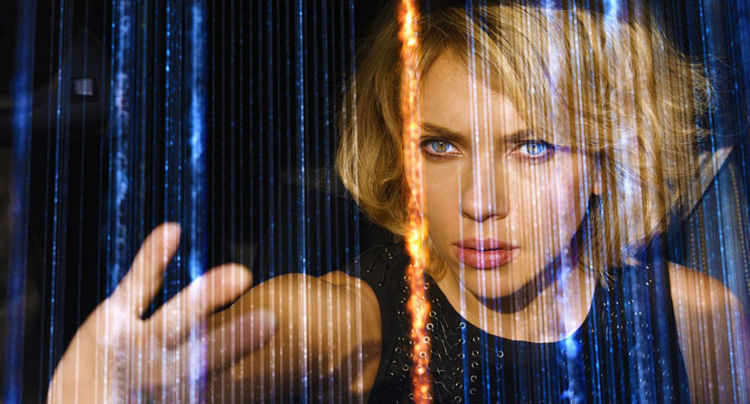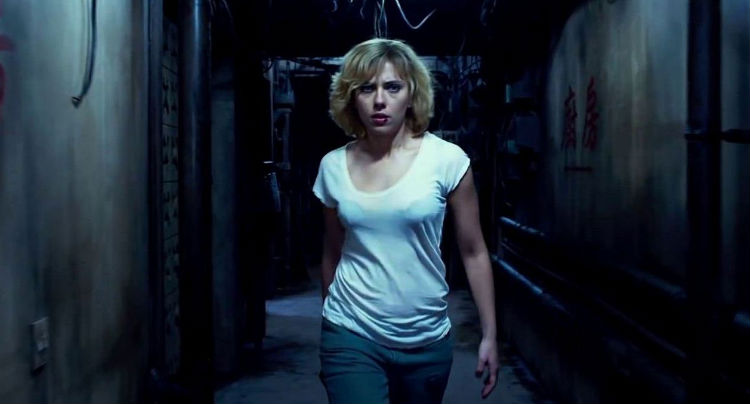
As Lucy loses more of herself, ascending to a higher existence, our reasons to care for her vanish into thin air.

As Lucy loses more of herself, ascending to a higher existence, our reasons to care for her vanish into thin air.
In a film like Lucy, Luc Besson’s new existential action flick starring Scarlett Johansson, the stakes are everything. High stakes, forged through effective storytelling, can imbue even the sleepiest action scene with an invaluable sense of urgency, excitement, and suspense. Lucy‘s fatal flaw is that it’s one of only a handful of films where the stakes actually diminish as the film progresses, as the human aspects of the story are abandoned in lieu of big ideas that evoke nothing, emotionally. The film doesn’t even suffice as a dumb-fun action movie; it spends too much time shoving its ideas down your throat, and the “action” scenes are disposable. You’d be better off watching Besson’s much better “super-woman” film, The Fifth Element.
Let’s talk about that (much better) film’s heroine, Leeloo Dallas (multipass), played by Milla Jovovich: She’s a super-skilled, “perfect” warrior, but as the story unfolds, she learns about humanity; she discovers laughter, trust, sacrifice, and love. As she transitions from humanoid to human, we fall for her, because in her journey we see ourselves and our life story. Johansson’s Lucy is the inverse of Leeloo, transforming from a vulnerable, relatable girl to a detached, invulnerable…”it”. We don’t understand “it”. We can’t connect with “it”. We don’t care what happens to “it”, so why should we care about where the film is going? It’s a bridge to nowhere, rendering its revelations and meditations inconsequential.

We meet Lucy in a tight bind; a (soon to be ex) boyfriend has forced her (via sneaky handcuff application) to deliver a mysterious briefcase to a man called Mr. Jang (Min-sik Choi) in a hotel in Taipei, where she’s studying abroad. When she meets Mr. Jang in his hotel room, he’s surrounded by generic-looking thugs, there are dead bodies on the ground, and his suit and face are stained with fresh blood. Besson intercuts Lucy’s predicament with shots of a lion hunting a gazelle, a tired metaphor revisited throughout the film, meant to signify that this story exists on an ultimate, grand stage unstuck from time and space. Terrance Malick did it better in The Tree of Life.
To avoid spoilers, let’s just say Mr. Jang imposes his will on Lucy, and she ends up overdosing on a new, neon-purple drug that allows her to use more than 10% of her brain’s capacity, the ceiling that no human has yet to exceed. (The “10% brain capacity” factoid is utterly erroneous, but this is sci-fi, so it’d be unfair to hold this inaccuracy against the film; scientific absurdity is allowed and welcome.)
Lucy’s condition–in which her brain power gradually increases, granting her supernatural powers like telekinesis, and the ability to control time and matter–is explained at painful length by Morgan Freeman throughout the movie. He plays a professor or scientist of some sort, and whatever mental image of him in that role just popped in your head is exactly what you’ll see in the movie. Morgan Freeman does everything Morgan Freeman does, except one, sorely missed thing. Why do you cast him in a movie? Usually (and Lucy is no exception), it’s to add gravity and credibility to the film. He adds neither of those here, so all his performance amounts to is a Mount Everest of insufferable exposition.
As Lucy’s powers grow, she hemorrhages her humanity, and the film follows suit. As she loses more and more of herself–ascending to a higher existence out in the ether, disposing of every baddie that stands in her way with a flick of a wrist–our reasons to care for her vanish into thin air. She even kills innocent people, for goodness sake.
The film’s trailer promised a pulse-pounding cross between Kill Bill and Carrie, with Lucy displaying myriad feats of superhuman badassery. These showcase sequences under-deliver entirely, with all of them being either a formless mess (a shoehorned car chase, an overwhelmingly ordinary hallway shootout), or a sterile special effects expo (time manipulation and anti-grav shots). To top it all off, the film has one of the most uncomfortable, cold-as-ice movie kisses I’ve ever seen. Besson may please some with Lucy‘s visual fireworks and veneer of profundity, but it’ll leave most feeling empty inside, hungry for an action flick with real bite.